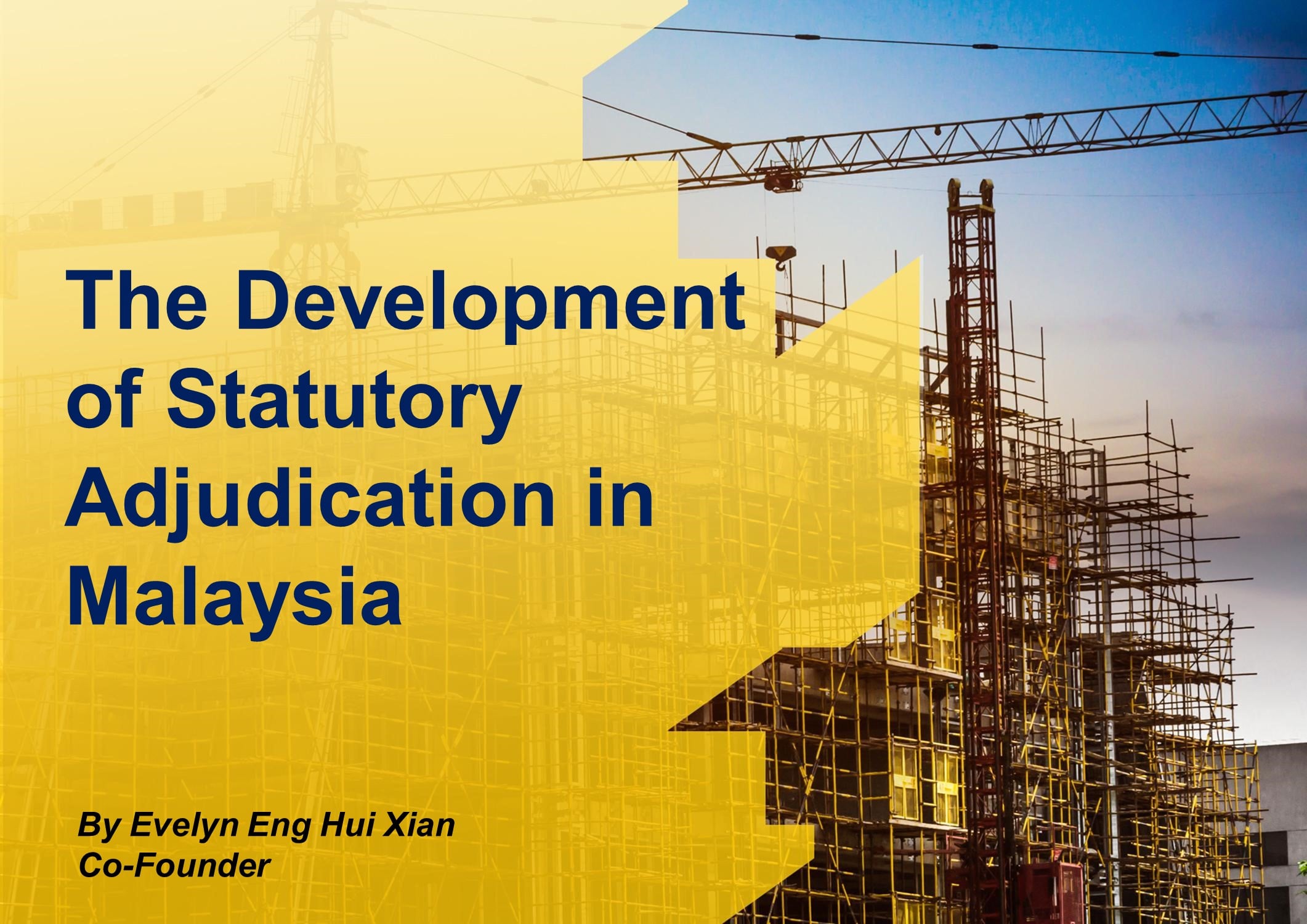Author: Evelyn Eng Hui Xian
The Construction Industry Payment and Adjudication Act 2012 (CIPAA) came into operation on 15 April 2014. CIPAA was introduced to provide for a speedy and efficient mechanism for settling disputes in construction contracts on a provisional interim basis, and requiring the decision of adjudicators to be enforced pending the final determination of disputes by either arbitration, litigation or agreement. The Parliament has not abolished arbitration and litigation of construction disputes; it has merely introduced an intervening provisional stage in the dispute resolution process. Crucially it has made it clear that decisions of adjudicators are binding and to be complied with until the dispute is finally resolved.
The process for dispute resolution under CIPAA is quick and relatively cheap in comparison to legal proceedings and arbitrations. The primary objective of CIPAA is to address cash flow problems that have plagued the construction industry for the longest time. The practice of having a conditional payment clause, be it a “pay-when-paid” or “pay-if-paid” or “back-to-back”, was pervasive and prevalent in the construction industry. Section 35(1) of CIPAA prohibits conditional payment terms and provides that a conditional provision in a construction contract is void. Conditional payment means obligations to make payment conditional on having received payment from 3rd party or obligation to make payment conditional on financing facilities. CIPAA is meant to somehow address the problems associated to late and non-payment in the construction industry.
CIPAA also provides for the recovery of payment upon the conclusion of the adjudication process unless the decision is stayed (by application made to High Court). In the judgement of TALLY WIEJL (UK) LTD v PEGRAM SHOPFITTERS LTD, Lord Justice May quoted that “those who consider and make policy for the building industry, including the government, have taken a general view over the years that a temporary balance should in appropriate circumstances fall in favour of those who claim payment, at the temporary expense if necessary of those who pay”. Under CIPAA, The adjudicator’s decision would be enforceable but if agreement did not follow for the dispute as a whole, it would be then determined by arbitration or litigation and the eventual final answer implemented.
Other remedies provided under CIPAA includes that of suspension of work or right to reduce the rate of work progress (without prejudice to the claimant’s right for extension of time or loss and expenses) or even to secure direct payment from the principal. As long as the necessary written request required under Section 30 of CIPAA is issued to the principal, the principal is obliged to make to the party who obtained the adjudication decision in its favour. It is irrelevant if the principal is not a party to the adjudication proceedings or does not have knowledge of the adjudication proceedings. However, there are some practical problems with direct payment, which includes potentially creates a collateral contract between sub-contractor and principal and direct payment to sub-contractor may not have taken into account defects or delays, leaving main contractor saddled with all defects and LAD claims by principal.
CIPAA’s application to construction work in Malaysia is widely defined in the Act. The case of MARTEGO SDN BHD V ARKITEK MEOR & CHEW SDN BHD & ANOTHER CASE [2017] 1 CLJ 101, considered an interesting question: whether an architect rendering purely architectural services with respect to a construction project may claim his outstanding fees from his client under CIPAA. The learned High Court Judge disagreed with the claimant’s argument that “construction consultancy contract”, as defined under Section 4 of CIPAA, did not apply to contracts which provide purely consultancy services. His Lordship found that the word “includes” used in the definition was designed to give an expansive meaning and not an exhaustive one – the matters stated in the definition are more by way of examples, leaving the scope and ambit of the defined word open ended. This meant that CIPAA applies to consultancy contracts which provide purely consultancy services.
Although CIPAA’s scope of application is intended to be wide and extensive, it is not without exceptions. CIPAA shall not affect any proceedings relating to any payment dispute under a construction contract which had been commenced in any court or arbitration before CIPAA came into force. The other exemptions under CIPAA is contained in Section 3 (buildings of less than four storeys intended for self-occupation and Section 40 (exemptions pursuant to Ministerial Order, such as the 2014 Exemption Order).
Statutory adjudication in Malaysia is still very much in its infancy which requires to be built in the time to come and in particular on the interpretation of the provisions of CIPAA. It is evident that adjudication is not a “perfect” justice but dispute can be resolved quickly and economically while any injustice would be corrected by arbitration or litigation. In conclusion, it seems that the need to have the “right” answer has been subordinated to the need to have an answer quickly.
Evelyn Eng Hui Xian | Advocates & Solicitors
Co-Founder
IPM Group
![]()
View Article in PDF »

